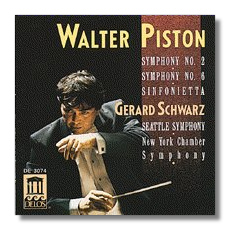
The Internet's Premier Classical Music Source
Related Links
- Piston Reviews
- Latest Reviews
- More Reviews
-
By Composer
-
Collections
DVD & Blu-ray
Books
Concert Reviews
Articles/Interviews
Software
Audio
Search Amazon
Recommended Links
Site News
 CD Review
CD Review
Walter Piston

Symphonies #2 & 6
- Sinfonietta (1941)
- Symphony #2 (1943)
- Symphony #6 (1955)
Seattle Symphony Orchestra/Gerard Schwarz
New York Chamber Symphony Orchestra/Gerard Schwarz
Recorded 1988-89 at the Seattle Opera House & the 92nd Street YMHA, New York City
Produced by Adam Stern
Delos Records DE3074 DDD 66:55
For the listener with an abiding fear of contemporary music, Walter Piston (1894-1976) makes the transition from Pachelbel to Rochberg seem less daunting. The familiar comforts of recognizable melody and harmony are wedded with newer forms: syncopation, Americana, and modern textures. The symphonies presented here sound painstakingly crafted. Along with their understated beauty, they reward the careful listener with new insights each time they are heard.
With Piston, Gerard Schwarz and Delos continue their remarkable survey of American composers. Both orchestras are absolutely first-rate. The Seattle Symphony, playing at home in the opera house, sounds rich and balanced in all sections. The moderately dry acoustic assures that the lushness does not become florid. In the Sinfonietta, the New York ensemble enjoys equal rapport with Schwarz. Their smaller size gives the strings a more intimate character which is entirely appropriate. The digital sound is quite life-like.
Piston was recognized as a master of composing for instruments. Before he became a professor of music at Harvard, he made his livelihood playing in dance halls and bars. He was also a considerable graphic artist with an interest in architecture. His Second Symphony (1943), which won the first of two Pulitzer prizes, shows an accomplished neo-Classicist; the opening Moderato has marked fluctuations in mood – the kind of variety one expects from an overture. Pastoral moments of flute and violin are chased away by a humorous jug band. Piston has Coplandesque moments, but his folk quotations are mostly reserved.
The Sixth Symphony (1955) enhances tonal play. The lyricism has a beautiful foreboding character. A solo cello states the venerable B-A-C-H motive towards the end of the third movement, before the finale breaks towards the sunlight of a major key. On the disc's program, the Sinfonietta comes between the symphonies. It is also certain to hold your interest.
Copyright © 1998, Robert J. Sullivan


















